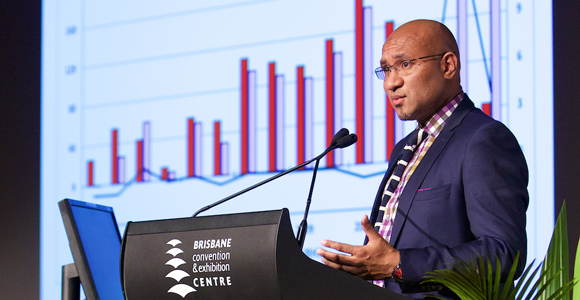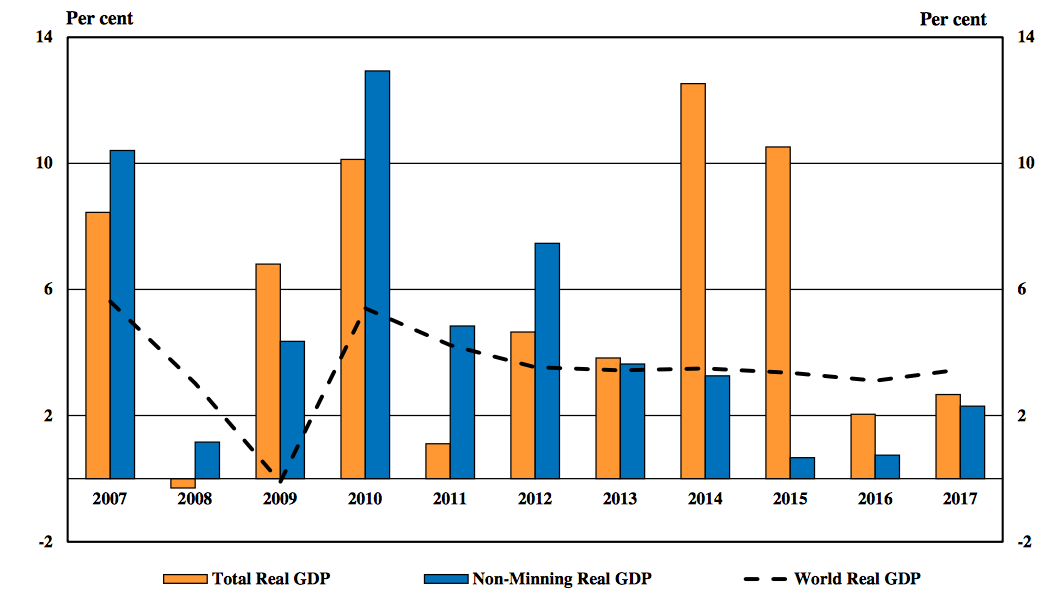The Papua New Guinea Government needs to look at raising more revenue, as well as keeping its expenditure under control, according to Dairi Vele, Secretary of the Department of Treasury.

Treasure Secretary Dairi Vele
In a frank address to a joint University of Papua New Guinea/Australian National University event in Port Moresby, Treasury Secretary Dairi Vele outlined some of the budgetary challenges facing the incoming O’Neill Government.
Vele said the PNG economy is recovering from its economic shocks and inflation is moderating below 7 per cent. But, he said, total revenue is projected to be lower by K514 million from 2017 Budget estimates, and total expenditure projected to increase by K430.1 million.
The Mid-Year Economic Forecast (MYEFO) also has PNG’s debt at 34.9 per cent, up from 32.4 per cent in 2016.
Cycles
Vele said PNG’s debt ceiling is an important discipline when dealing with volatile economic cycles.
‘When the revenues came in from the boom, we started focusing on spending and not making money.’
‘People have different views but I think that 30 per cent for a country growing as fast as we are, it is a very low ratio. The good thing about having a 30 per cent limit in good times is that it gives you discipline. When times are tough it takes away your optionality.
‘We are a price taker, not a price maker. The price of oil and gold is decided in markets far, far away. We just live with it.’

PNG’s real GDP (orange), real non-mining GDP (blue) and world GDP (dotted line). Source: Department of Treasury, Macroeconomic Policy Division
Revenue
Vele said the other side of the ledger is to improve revenue collection.
‘We need to start focusing on revenue. When the revenues came in from the [LNG construction] boom, we started focusing on spending—and not making—money.
‘It blows my mind that in any one year we can have 20,000 business registrations and then we only have 2000 applications for tax file numbers.’
‘We have a medium term fiscal strategy, which guides our spending habits. We have got a medium term debt strategy to focus on how we are going to fund our spending habits.
‘But we don’t have a medium term revenue strategy.’
Tax
Vele said it is important to be ‘clever’ about how taxes are raised, however. He said there are deep systemic problems with tax collection in PNG.
‘It blows my mind that in any one year we can have 20,000 business registrations and then we only have 2000 applications for tax file numbers.
‘There are all these shops and retailers popping up everywhere. I can assure you none of those people are paying tax.’
Vele pointed to the fisheries and forestry sectors as especially problematic.
Expenditure
Vele says PNG will be better positioned when the next resource boom comes, but said government is expanding too much.
‘We went from having something like 70 organisations to 125 different offices, each with a Managing Director, each with a board, each with a minister, each with an executive officer. It can’t continue.
‘Over the years, we were supposed to cut. In some sectors, we have six different offices: I don’t know what they are doing. In the old days, it used to be one department and one office.
‘We need to deal with this. It is in the provinces where the problem is. We can’t keep track of how many teachers and how many health workers there are.’








Speak Your Mind